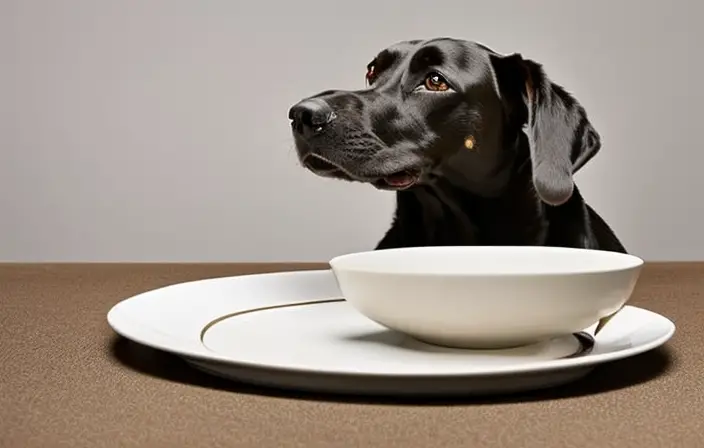Can Dogs Eat Capers
Hey there, dog owners! Ever wondered if your furry friend can munch on capers? Well, wonder no more! This article is here to give you all the details on whether dogs can eat capers or not.
We’ll dive into the health benefits of capers for dogs, potential risks involved, and even offer some alternative treats for your pup.
So, grab a cuppa and let’s find out if those tiny little green delicacies are safe for your four-legged companion to enjoy.
Key Takeaways
- Capers can be harmful to dogs due to their potential choking hazard, high sodium content, and the possibility of allergic reactions.
- It is best to avoid giving capers to dogs altogether and opt for alternative safe options like dill weed or parsley for flavor.
- When incorporating new ingredients into a dog’s diet, start with small portions, monitor for adverse reactions, and follow serving size guidelines provided by veterinarians or pet nutritionists.
- Offer a variety of dog-friendly treats like carrot sticks, frozen yogurt bites, and peanut butter-filled Kong toys to cater to their preferences and provide nutritional benefits.
Health Benefits of Capers for Dogs
You’ll be glad to know that capers can provide numerous health benefits for your dog. Not only are they a tasty addition to many dishes, but they also offer several advantages when it comes to your furry friend’s well-being.
Similar to the benefits of capers for humans, these little green wonders are rich in antioxidants, which help protect cells from damage caused by harmful free radicals. Additionally, capers contain vitamins and minerals such as vitamin K and iron, which contribute to bone health and oxygen transportation in the body.
When it comes to cooking with capers for your dog, there are a few things to keep in mind. First and foremost, moderation is key. While capers can be a healthy treat for your pup, too much can lead to an upset stomach or diarrhea due to their high salt content. It’s best to start with small amounts and monitor how your dog reacts before incorporating them into their regular diet.
One way you can introduce capers is by chopping them up and sprinkling them over your dog’s food as a flavorful garnish. You could also mix them into homemade treats or add them as an ingredient in cooked meals like scrambled eggs or pasta dishes (without any added salt or seasoning). Remember always to consult with your vet before introducing new foods into your dog’s diet, including capers.
Overall, when given in moderation and prepared properly, capers can offer some health benefits for dogs. So go ahead and share the joy of this delicious ingredient with your furry companion!
Potential Risks of Feeding Capers to Dogs
Be cautious when feeding your furry friend capers, as they may pose potential risks. While capers can be a tasty addition to your meals, they are not suitable for dogs in large quantities. Here are some precautions you should take when considering feeding capers to your canine companion:
-
Choking Hazard: Capers are small and round, making them a potential choking hazard for dogs, especially smaller breeds or those prone to gulping their food.
-
Sodium Content: Capers are brined in saltwater, which means they have a high sodium content. Excessive sodium intake can lead to dehydration, electrolyte imbalance, and even kidney problems in dogs.
-
Allergic Reactions: Some dogs may have allergic reactions to capers or the brine they are preserved in. Common symptoms include itching, rashes, swelling of the face or throat, vomiting, and diarrhea.
To ensure the safety of your four-legged friend, it is best to avoid giving them capers altogether. If you still want to incorporate flavors into their diet similar to capers, consider using alternative safe options like dill weed or parsley.
As always, it’s important to consult with your veterinarian before introducing any new foods into your dog’s diet. Your vet will be able to provide specific guidance based on your dog’s individual needs and health condition.
Remember that keeping your pup healthy and happy should always be the top priority!
Proper Preparation and Serving Size for Dogs
When preparing food for your furry friend, it’s important to consider proper portion sizes and how to serve it safely. Introducing new foods to dogs can be an exciting adventure, but it’s crucial to do so in a way that ensures their health and well-being.
One of the best ways to introduce new foods is by incorporating dog-friendly recipes into their diet. Dog-friendly recipes are specifically designed with your pup’s nutritional needs in mind. They often include ingredients such as lean meats, vegetables, and grains that provide essential nutrients like protein, vitamins, and minerals. These recipes not only offer variety but also promote good overall health.
When introducing new foods, start by offering small portions and gradually increase the amount over time. This allows your dog’s digestive system to adjust and prevents any potential upset stomachs or allergies. It’s also important to monitor your dog for any adverse reactions after trying a new recipe.
In terms of serving size, it’s essential to follow guidelines provided by veterinarians or pet nutritionists. Portion control is key in maintaining a healthy weight for your pup. Too much food can lead to obesity and its associated health problems, while too little may result in malnutrition.
Alternative Treats for Dogs Instead of Capers
If your pup isn’t a fan of capers, there are alternative treats available that can satisfy their cravings. Capers may not always appeal to dogs, even though they can be a tasty addition to certain dishes for humans. Luckily, there are many healthy alternatives and homemade treats that you can offer your four-legged friend instead.
Here are some delicious options:
-
Carrot sticks: Dogs love the crunchiness of carrots, and they are packed with vitamins and minerals.
-
Frozen yogurt bites: Make your own frozen yogurt by combining plain yogurt with fruits like blueberries or strawberries. Freeze them in bite-sized portions for a refreshing treat.
-
Peanut butter-filled Kong toys: Fill a Kong toy with peanut butter (make sure it doesn’t contain xylitol) and freeze it. This will keep your dog entertained while offering them a tasty reward.
Final Thoughts on Dogs and Capers
To ensure your pup’s culinary adventures are enjoyable, remember to offer a variety of treats and flavors that cater to their individual preferences. While capers can be a tasty addition to many dishes for humans, it’s important to note that dogs may not share the same enthusiasm for these salty little buds.
While capers themselves aren’t toxic to dogs, they may cause an upset stomach or digestive issues if consumed in large quantities. So, it’s best to avoid giving your furry friend capers as a standalone treat.
However, if you’re looking for creative ways to incorporate capers into your homemade dog treats, there are a few options worth exploring. You could consider using small amounts of finely chopped or pureed capers as an ingredient in savory dog biscuits or training treats. This way, the flavor will be more subtle and balanced with other ingredients.
Remember, when incorporating any new ingredient into your dog’s diet or treats, it’s important to introduce them gradually and monitor their reaction closely. Always consult with your veterinarian before making any significant changes in your dog’s diet.
Frequently Asked Questions
Can Dogs Eat Capers if They Have a Certain Medical Condition?
If your dog has pancreatitis or kidney disease, it’s important to be cautious about their diet. While capers may not pose a direct threat, it’s best to consult with your vet before introducing new foods.
Are Capers Safe for Puppies to Consume?
Capers can add a burst of flavor to your puppy’s diet. They are safe for puppies to consume, but in moderation. While not nutritionally essential, they can be a fun and tasty addition to their meals.
Can Dogs Have an Allergic Reaction to Capers?
Dogs can have a mild reaction to capers, which may include symptoms like itching or swelling. Additionally, capers can cause digestive issues in dogs such as diarrhea or upset stomach. It’s best to avoid feeding them to your furry friend.
Should Capers Be Cooked Before Feeding Them to Dogs?
Before feeding capers to your dog, it is important to consider the potential risks. While capers may offer some benefits, such as being low in calories and high in antioxidants, they should be cooked first to remove any harmful bacteria.
Are There Any Specific Breeds of Dogs That Should Avoid Consuming Capers?
Certain dog breeds should avoid consuming capers due to potential side effects. Dogs with certain medical conditions may also be at risk. It’s important to consult with your veterinarian before introducing capers into your dog’s diet.
Conclusion
Congratulations! You’re now well-informed about whether dogs can eat capers. Remember, while capers do have some health benefits for dogs, it’s important to be cautious due to potential risks.
If you decide to feed your furry friend capers, make sure they are properly prepared and served in small portions. However, it might be best to opt for alternative treats that are safer and more suitable for dogs.
Always prioritize your dog’s well-being and choose their snacks wisely.

If Richie Bedard is a dog food expert, author, or any other figure in the field of dog nutrition that emerged after September 2021,






